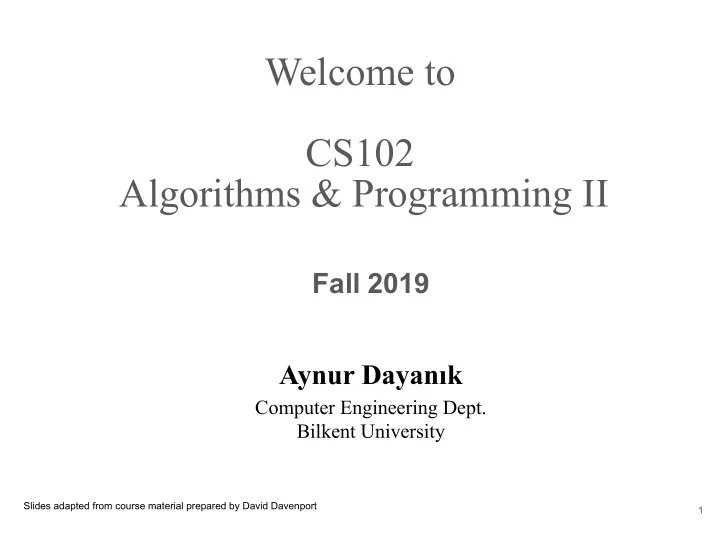

Welcome to CS102 Algorithms & Programming II Fall 2019 Aynur Dayanık Computer Engineering Dept. Bilkent University Slides adapted from course material prepared by David Davenport 1 Slides prepared by David Davenport
This course should help you… • improve your programming abilities Enhanced OOP ■ GUI & Event-driven programming ■ Recursion ■ Data structures ■ • practice core engineering skills Written & oral communication ■ Teamwork ■ Independent learning ■ 2
Course - Organisation • CS102 taken by all CS students (~65) in 1 section (1 instructor, 6 assistants!) ■ • 4 credits – 3hr lecture & 4hr lab every week • Two tracks… Lectures & Labs (as per CS101) ■ Design project ■ ● Group & project selection ● Requirements & UI design, Detailed Design ● Implementation & Demo 3
Course - Grading • Exams & labs are common to all sections • Overall grades course-wide, not section by section! Minimum course requirements to be eligible for final exam… • 15% Lab. Assignments • 25% Midterm Exam Must also do well on final exam to pass! • 25% Final Exam • 25% * Reports, Presentations & Participation {Requirements 6%, User-Interface 7%, Detailed Design 3%} Demonstration, Final Code & documentation 9%. (inc. wiki, weekly personal logs & peer grade) • 10% Homeworks & Quizzes * everyone in group gets same project grade (unless not doing their share!) 4
Minimum course requirements • minimum 30% on the midterm exam & • minimum 80% on each lab assignment & • reasonable contributions to each project stage. Failure to meet these minimum course requirements will result in an FZ grade. But don’t panic... providing you are working this shouldn’t be a problem! 5
Lab ~ Grading Scales Labs Notes: (100) Proficient Fully complete, correct • TAs will ask about code & and understood concepts. You may be required to (80) Acceptable make changes or do additional Almost fully complete, examples to test understanding. correct and/or understood • Your grade will be based on the (20) Weak TAs evaluation (not just the Incomplete/incorrect, poor submitted code) understanding, little real interest/effort shown • Code must be uploaded in the lab (you can upload multiple times (0) Nothing no real attempt! without penalty) else zero! 6
Project ~ Grading Scales Notes: Projects •Three report stages: (10) excellent (almost impossible!) Requirements, UI-Design, & Detailed-Design (8) good each having : report, presentation, (6) ok but could be better revision. (4) weak definitely not up to •then, Implementation & demo. scratch, more effort needed. •Reasonable contributions (0) no real attempt! to each stage of the project. •Process : ensures… building the right product & building the product right 7
Course - Misc ■ Lab sessions start week 3 ■ Use Moodle – check frequently! ■ See also (your section’s webpage) http://www.cs.bilkent.edu.tr/~adayanik/cs102 ■ Textbook ● Big Java: Late Objects, Enhanced eText, 2nd Ed., by Cay S. Horstmann, Wiley, 2016 (as for CS101) ■ Cheating/Plagiarim! 8
Good luck • ToDo ■ Enroll to Moodle (via SRS) ■ Lab assignment 1 (due in lab week 3) ■ Find group & project (asap!) ● same section only ● 6 people • Any questions? 9
Why are you here? • How did you understand the question? Here? The universe, the university, the CS or EE dept., CS102? • To Learn… (hopefully!) How? by being told (require background, must listen & apply !) by doing (no alternative, you must do it, no one can do it for you!) 10
Honesty & Trust • You expect us to be honest • And we expect you to be honest too! We do not intend to invest time & resources trying to prove otherwise. • You can only cheat yourself The course is arranged so there is little or no benefit in terms of grade, all you may gain by copying, is time now. In the long-run you will lose much more, in terms of both trust, learning & so grades! • Violations of trust That do come to light will be severely punished. • What counts as cheating? Acknowledge your sources . Always indicate the extent & source of any help you received or ideas used. 11
Recommend
More recommend